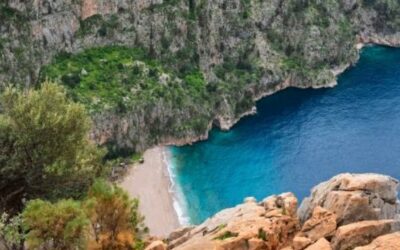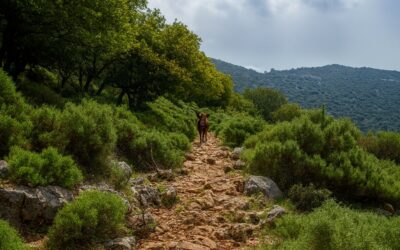Fethiye, one of the hidden paradises in southwestern Turkey, is not only a favorite of those seeking a sea-and-sun holiday but also of travelers in pursuit of history, nature, gastronomy, and culture. However, before setting off for Fethiye, there are a few important details you should know to explore the region more deeply and consciously.
This guide does not repeat the classic “which beach to go to, where to swim” questions. Instead, it highlights the character of the region, practical tips, and aspects that might catch you unprepared.
Fethiye’s Microclimate: Weather Surprises
Although Fethiye has a typical Mediterranean climate, its location causes surprisingly cool nights. While daytime temperatures can reach 38°C in summer, they may drop to 22–23°C at night. Keeping these sudden changes in mind is crucial. If you plan to camp or join an evening boat tour, packing a light cardigan will bring great comfort. In high-altitude areas like Saklıkent, the air can be chilly even in midsummer. So, instead of packing only swimsuits and shorts, it’s wise to prepare a layered suitcase.
Tourist Density and Quiet Spots
The Fethiye center and Ölüdeniz area are inevitably crowded in summer. But if you’d like to experience the region more “exclusively,” here’s what you should know:
-
In places like Kabak Bay, you may have no internet connection. This is not a drawback—think of it as a perfect digital detox.
-
Faralya village is one of the best spots to watch the sunset in peace, far from the crowds. The view of the sea from high cliffs will soothe your soul.
-
Staying at small family-run pensions recommended by locals lets you see the real Fethiye, beyond the tourist facade. These cozy places with authentic food offer a closer look at the region’s cultural richness.
Layers of History: Lycian Way and Ancient Cities
Fethiye is more than beaches—it’s the heart of the Lycian civilization. Ancient theaters, rock tombs, and traces of the Lycian Way greet you at every step. If you plan to hike the Lycian Way, don’t forget professional walking shoes. Trails can be tough in summer heat. Sites like Tlos, Xanthos, and Letoon are not only steeped in history but also a dream for photographers, thanks to their unique play of light. Visiting in the afternoon lets you witness the shadows dancing across the stone structures.
Gastronomy: More Than Just Fish
When it comes to food, Fethiye is often associated with fish. But there’s a hidden side to its local cuisine:
-
Keşkek – a traditional dish made of wheat and meat, cooked for hours, often prepared at weddings and special occasions.
-
Stuffed zucchini blossoms – picked early in the morning; you may miss them by noon.
-
Village bread and herb-filled gözleme – found at local markets and baked in stone ovens, offering a taste of authentic rural culture.
Pro tip: At Fethiye fish market, don’t just buy fish. Take it to one of the nearby restaurants—they’ll cook it fresh for you, so you can enjoy both fish and other local specialties.
Transportation and Freedom of Movement
Exploring Fethiye’s coastline by public transport is tricky. To truly discover its villages, hidden coves, and mountain towns, renting a car is almost essential. It allows you to access breathtaking landscapes at your own pace. Still, be prepared for narrow, winding mountain roads—they’re both challenging and rewarding. Navigation apps may not always work properly, so carrying an offline map is a smart backup.
Local Culture and Small Details
Locals are used to tourism, but bargaining is still alive—especially at markets. This is not just about shopping but also a way to engage socially. Thanks to the many British residents, you’ll find English spoken even in villages. But learning a few basic Turkish greetings will warm hearts and make interactions smoother. Nightlife in Fethiye isn’t limited to the city center. The Hisarönü area comes alive after sunset with bars, restaurants, and live music—a melting pot where locals and tourists mingle.
Frequently Asked Questions About Fethiye
When is the best time to visit Fethiye?
April–June and September–October are the most ideal periods. The crowds are fewer, and the temperatures are more balanced.
What should I definitely pack before going to Fethiye?
Comfortable walking shoes, a light raincoat, sunscreen, an offline map, and a small first aid kit.
Will I have issues with internet and mobile coverage?
No problem in the center, but in isolated places like Kabak Bay and Faralya, the signal can be weak. In fact, that’s what preserves the peaceful vibe.
Is renting a car mandatory?
Not mandatory, but highly recommended. Public transport only goes to limited spots. To reach hidden bays and remote villages, a car is the way to go.
Now you know the essentials before heading to Fethiye. All that’s left is to see the beauty with your own eyes! Discover the spirit of Fethiye in the video below.




